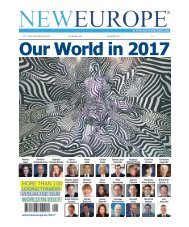Our World-Struck by the Pandemic
Create successful ePaper yourself
Turn your PDF publications into a flip-book with our unique Google optimized e-Paper software.
POLITICAL ECONOMY OF A PANDEMIC<br />
critics in a spiral of attacks against a weak<br />
and imperfect Union. Because democracy,<br />
since <strong>the</strong> times of <strong>the</strong> A<strong>the</strong>nians or<br />
<strong>the</strong> downfall of <strong>the</strong> Roman Republic,<br />
has always been weak and imperfect.<br />
Weak against <strong>the</strong> propaganda machine<br />
of autocrats, imperfect vis-à-vis <strong>the</strong><br />
ostensible promises of messianic rule:<br />
an easy target for egocentric politicians<br />
able to accede to leadership but unable<br />
to actually lead, and in constant need of<br />
a scapegoat.<br />
I do not blame colleagues who, amidst<br />
<strong>the</strong> current crisis, suggest that China or<br />
Russia are showing greater solidarity than<br />
<strong>the</strong> EU itself. They suffer from <strong>the</strong> stress<br />
created <strong>by</strong> this pandemic, and from <strong>the</strong><br />
lack of European leadership in comparison<br />
with <strong>the</strong> concrete actions, however<br />
insidious, which we are witnessing in<br />
o<strong>the</strong>r corners of <strong>the</strong> world. Let’s face <strong>the</strong><br />
uncomfortable truth: <strong>the</strong> only way for<br />
democracy to survive is for leaders to step<br />
up in times of need. Unfortunately I do not<br />
see today a Pericles, Churchill or de Gaulle.<br />
“So <strong>the</strong>n what?” an anxious Twitter<br />
follower might ask. Now enters <strong>the</strong><br />
pragmatist (not to be confused with<br />
<strong>the</strong> bureaucrat!): someone who deep<br />
in his heart knows, like millions of o<strong>the</strong>r<br />
Europeans, that this imperfect Union, this<br />
artificial construct created <strong>by</strong> its Founders<br />
and still in ever-evolving process of<br />
creation, is <strong>the</strong> only shield protecting us<br />
from having Putin or <strong>the</strong> idolised leader<br />
of <strong>the</strong> Chinese Communist Party held<br />
aloft as a paragon of perfection. So what<br />
can we do to protect and promote our<br />
democracies and our European Union?<br />
First, we must humbly admit our<br />
mistakes. Looking back, we can detect<br />
two recent warning signs. The first was<br />
<strong>the</strong> refusal, <strong>by</strong> a significant number<br />
of European citizens, of <strong>the</strong> European<br />
Constitution; <strong>the</strong> second is <strong>the</strong> bad blood<br />
which has remained in many parts of<br />
our society after <strong>the</strong> financial crisis. I am<br />
convinced that European citizens want<br />
us to concentrate on solving <strong>the</strong>ir real<br />
problems ra<strong>the</strong>r than fixate on <strong>the</strong> details<br />
of a possible European senate or whe<strong>the</strong>r<br />
or when <strong>the</strong> EU might become a happy<br />
federation. Let’s leave <strong>the</strong>se big dreams<br />
to <strong>the</strong> next generation — a generation I<br />
am confident will be capable of achieving<br />
<strong>the</strong>m — and concentrate instead, in <strong>the</strong><br />
here and now, on filling <strong>the</strong> fissures in <strong>the</strong><br />
very hull of our ship. We all know <strong>the</strong>re<br />
are many of <strong>the</strong>m, <strong>the</strong> lack of coordination<br />
in health emergencies being one of <strong>the</strong><br />
most tragic and prominent examples.<br />
(Ah! Had Member States only listened to<br />
Michel Barnier in 2006 when he proposed<br />
a European initiative to response to<br />
emergencies such as pandemics . . .)<br />
Secondly, we must be ambitious in real<br />
and concrete things. Like many o<strong>the</strong>rs in<br />
<strong>the</strong> EU institutions, I am often weary of<br />
<strong>the</strong> reality that so many of our citizens are<br />
unaware of <strong>the</strong> good work we are doing.<br />
This is because <strong>the</strong> European Council,<br />
<strong>the</strong> EU’s only non-transparent body, is<br />
<strong>the</strong> one really calling <strong>the</strong> shots. I am tired<br />
of secret meetings <strong>by</strong> <strong>the</strong> EU’s real power<br />
players — i.e. our national governments:<br />
meetings in which bad decisions are<br />
blamed on <strong>the</strong> EU while good ones result<br />
in praise for visionary national leaders<br />
who in turn fail to ever mention <strong>the</strong> EU<br />
in <strong>the</strong>ir subsequent ’’war reports’’ to <strong>the</strong><br />
press. Enough of this! When a new bridge<br />
is built in a small town, when EU citizens<br />
are no longer burdened <strong>by</strong> roaming<br />
fees, or when funds arrive to relieve <strong>the</strong><br />
consequences of a critical pandemic: all<br />
this is thanks to <strong>the</strong> EU. But <strong>the</strong> fact is<br />
not recognised <strong>by</strong> some governments,<br />
interested only in convincing <strong>the</strong>ir<br />
electorates of <strong>the</strong>ir own ability to defend<br />
<strong>the</strong> national interest against imaginary<br />
usurpation and racketeering taking place<br />
in Brussels.<br />
Thirdly, we must be transparent and<br />
accountable. Those European countries<br />
which will be transparent in managing <strong>the</strong><br />
coronavirus pandemic will also be <strong>the</strong> first<br />
to overcome <strong>the</strong> economic and social crisis<br />
ahead. In 1918 it was American soldiers<br />
who brought <strong>the</strong> so-called ‘’Spanish flu’’ to<br />
<strong>the</strong> battlefields of Europe, causing millions<br />
of deaths worldwide. Why did it come to<br />
be known as Spanish flu? Because Spain,<br />
a neutral country at <strong>the</strong> time, was alone in<br />
not counting deaths from <strong>the</strong> disease as<br />
casualties of war. The transparency that<br />
spawned such an ironic misnomer also<br />
gave to Spain a credibility it took o<strong>the</strong>r<br />
countries some time to regain.<br />
After more than<br />
twenty years living and<br />
breathing this European<br />
debate, I am convinced<br />
we must change <strong>the</strong><br />
narrative. The EU is not<br />
a matter of ei<strong>the</strong>r love<br />
or hate; it exists because<br />
we need it. We needed it<br />
after <strong>the</strong> Second <strong>World</strong><br />
War; and we need it<br />
today, more than ever.<br />
In our current context, it is not<br />
European institutions which must be<br />
more transparent in <strong>the</strong>ir approach —<br />
<strong>the</strong>y already are. Where transparency is<br />
lacking is on <strong>the</strong> part of some Member<br />
State governments. The deficiency<br />
<strong>the</strong>refore lies among members of <strong>the</strong><br />
Council, a body which has not received<br />
a mandate on behalf of <strong>the</strong> entire<br />
European population. This is why we<br />
must again insist on a discussion of<br />
<strong>the</strong> Spitzenkandidat: a directly elected<br />
European leader, directly accountable to<br />
all European citizens. A leader who can<br />
take decisions at European level — and<br />
<strong>the</strong>refore a leader who is responsible for<br />
taking <strong>the</strong> lead and who can thus be held<br />
accountable for his or her actions. A leader<br />
elected <strong>by</strong> and for <strong>the</strong> European people.<br />
We must surely focus now on <strong>the</strong><br />
immediate crisis at hand. But it will<br />
soon be time to return our attention to<br />
<strong>the</strong> future of Europe. To what kind of<br />
Europe we want and need. For though<br />
<strong>the</strong> EU is imperfect, make no mistake: it<br />
is a necessity. And it will be this crucial<br />
discussion which will allow us to overcome<br />
<strong>the</strong> current problems of transparency,<br />
accountability and coordination, and<br />
which will enable us to more efficiently<br />
prepare for future crises. But this is just<br />
<strong>the</strong> view of a pragmatist.<br />
34 MAY 2020 | OUR WORLD










